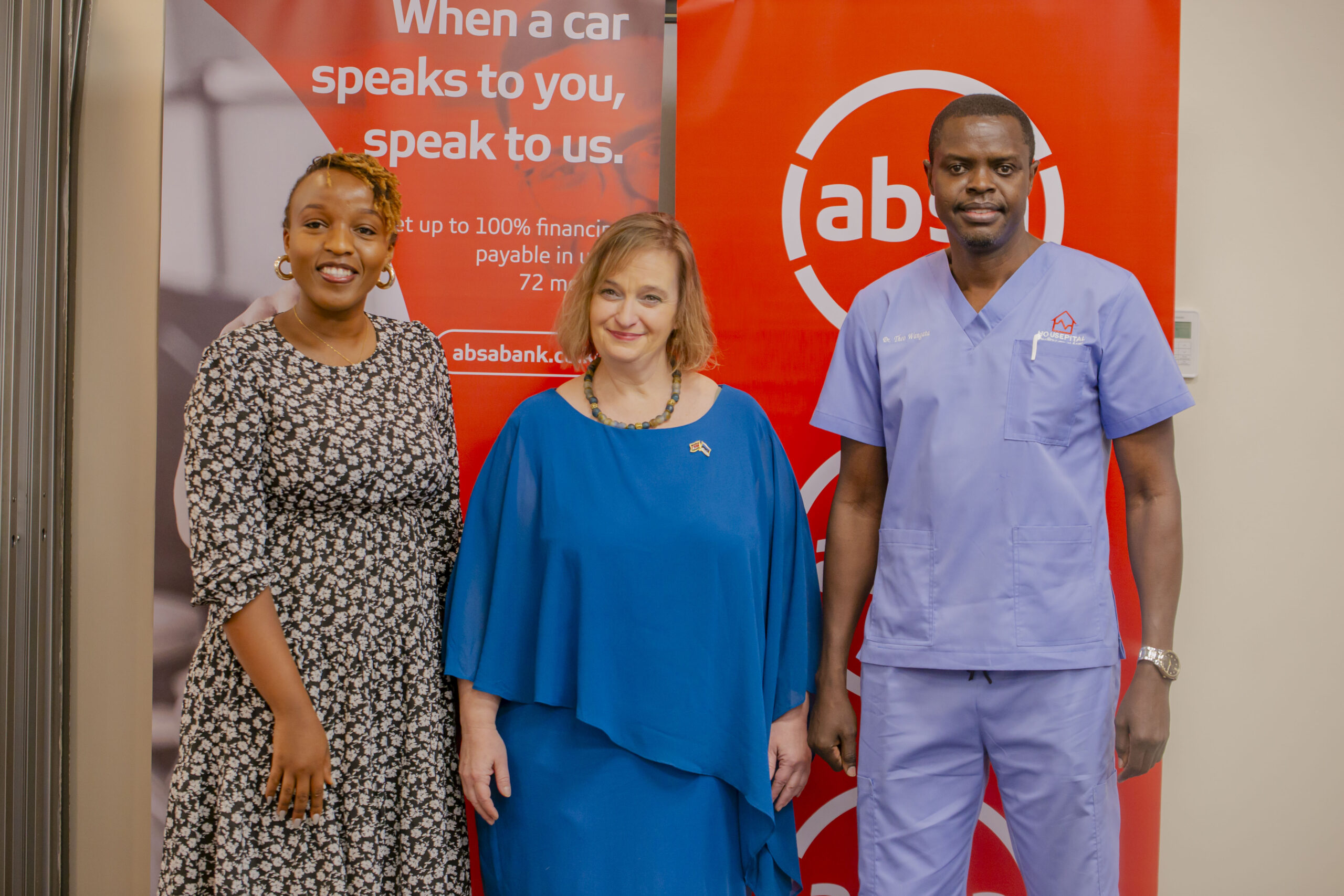By Dennis Muritu
In an age where convenience is king, healthcare is often the last frontier to embrace this shift. But thanks to an innovative concept by Dr. Theo Wangata, a general physician at Precise Health Care and Hospital, the hospital experience is no longer confined to traditional brick-and-mortar facilities. The concept, aptly named “Housepital,” merges the hospital experience with the comfort of home, delivering comprehensive healthcare services directly to patients’ doorsteps.
The Birth of a New Healthcare Concept
The name “Housepital” is a fusion of two words: “house” and “hospital.” According to Dr. Wangata, it represents a revolutionary approach to healthcare by bringing the full spectrum of hospital services into patients’ homes. The idea isn’t just about sending a doctor for a home visit—it’s about replicating the entire hospital experience, from consultations to diagnostics and even advanced care, all in the familiar environment of one’s residence.
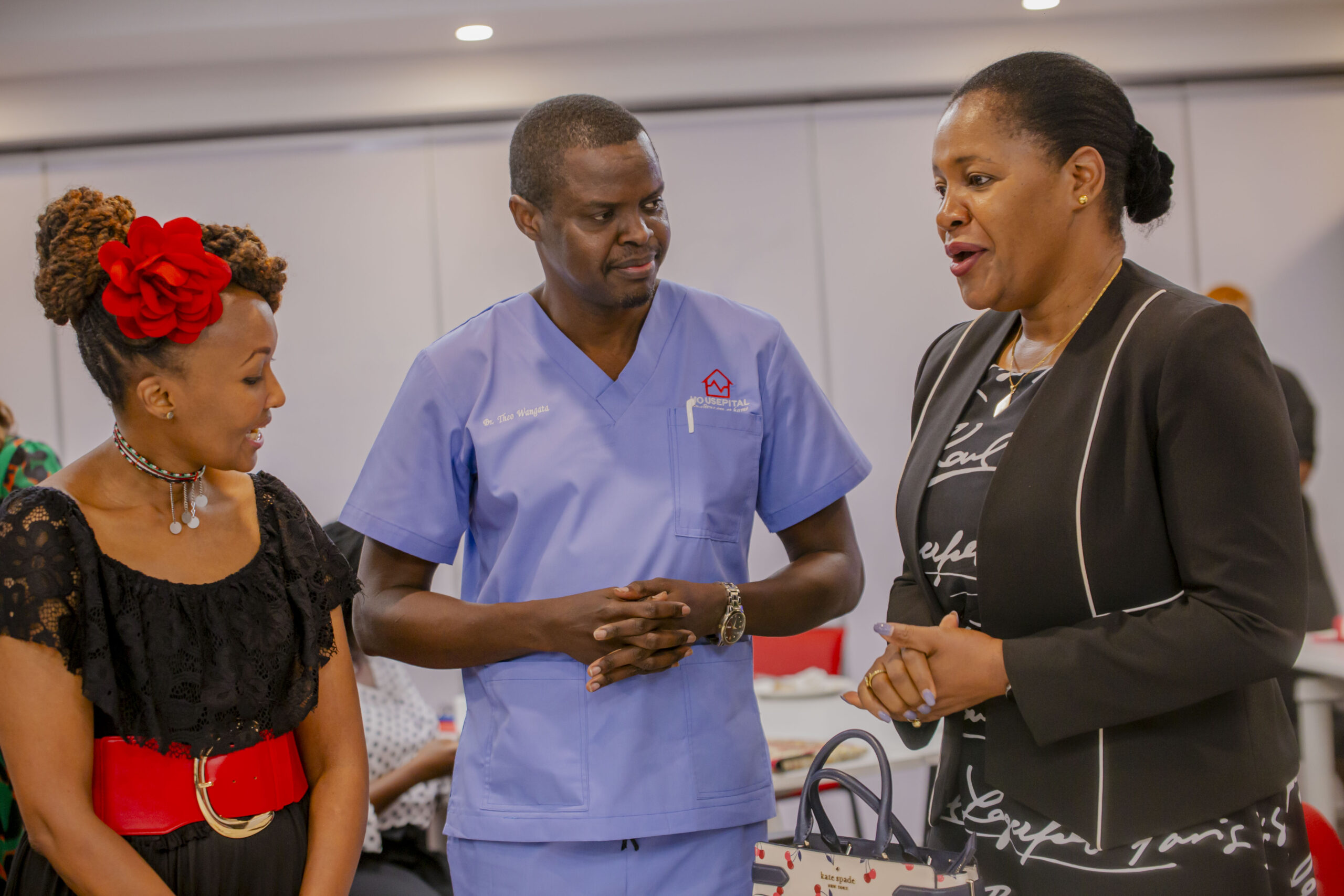
Photo Caption: With ABSA Bank Kenya Banking Director Elizabeth Wasuuna and Golden connections international CEO Makena Mathiu (in the red flower)
“When you go to a hospital, you’re not just going to see a doctor,” Dr. Wangata explains. “You might need medicines, laboratory tests, x-rays, or even specialists like a psychiatrist or cardiologist. We bring all these advanced treatments to the house.”
Services Offered: Beyond Traditional Home-Based Care
Housepital provides a broad array of services that go beyond the traditional concept of home-based care, which often focuses on wound dressing or basic nursing for chronic conditions. Dr. Wangata’s vision extends to offering:
Doctor Visits and Specialist Care
From general practitioners to specialists like dermatologists and cardiologists, Housepital ensures patients receive expert care at home. Support staff, including physiotherapists, counselors, and nutritionists, are also part of the package.
Home Admissions and Nursing Services:
Patients who would otherwise require hospitalization can now be admitted and cared for at home. Housepital provides professional nurses along with the necessary equipment, such as oxygen machines and ICU-grade monitors, ensuring a high standard of care.
Portable Diagnostics:
State-of-the-art diagnostic tools like portable x-ray machines and ultrasound devices are transported to patients’ homes. Expectant mothers, for instance, no longer need to travel for prenatal scans; the technology comes to them.
Laboratory Testing:
While complex tests are processed in a lab, Housepital staff can collect samples at home. Routine tests like blood sugar levels are conducted on-site for instant results.
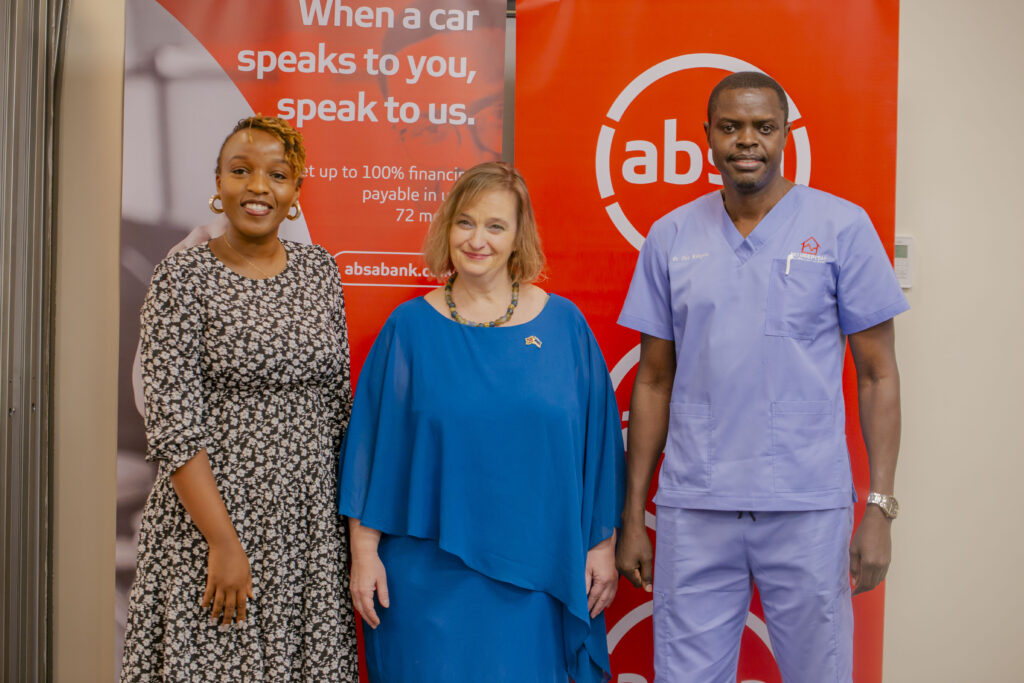
Caption (Left-right) Faith Muthoni, H. E. Kadri Yumal the Honorary Consul of the Republic of Estonian and Dr. Theo Wangata
Medication Delivery and Emergency Services:
Medications can be delivered even in the middle of the night, while emergency services include ambulance transfers within and across counties, and even internationally. For patients traveling abroad, Housepital ensures a nurse accompanies them if needed.
Read also: Africa Health and Economic Transmission unveiled in Kenya
Private Hospital Nursing:
For patients hospitalized in conventional facilities, Housepital offers private nurses to provide personalized care. “Hospitals often serve many patients with limited nursing staff,” says Dr. Wangata. “We fill this gap by providing dedicated nurses who ensure patients eat, stay mentally engaged, and remain comfortable.”
A Personal and Cost-Effective Approach
The Housepital model challenges the conventional norms of inpatient care. Traditional hospitals are structured to have one nurse attend to multiple patients. In contrast, Housepital provides one-on-one care, ensuring each patient receives full attention. This personalized care extends beyond clinical needs, addressing mental and emotional well-being as well.
Moreover, the financial implications are compelling. Hospital admissions often incur substantial costs due to bed charges, food services, and administrative overhead. Housepital significantly reduces these expenses by eliminating the need for hospital beds and related logistics. Additionally, family members save time and money otherwise spent commuting to hospitals during restrictive visiting hours.
Read also:Kenya to train 25,000 community health workers in first phase of Africa CDC and Red Cross initiative
“Imagine if you’re removing that bed cost,” Dr. Wangata elaborates. “You’re also reducing the cost of the treatment while giving relatives more time with the patient. They can even work from home while caring for their loved one.”
The COVID-19 Catalyst
The genesis of Housepital lies in the COVID-19 pandemic—a period when hospital beds, oxygen supplies, and medical staff were in critically short supply. Dr. Wangata recalls a Sunday morning in late 2020 when he received a distress call from a family unable to find a hospital bed for a critically ill COVID-19 patient.
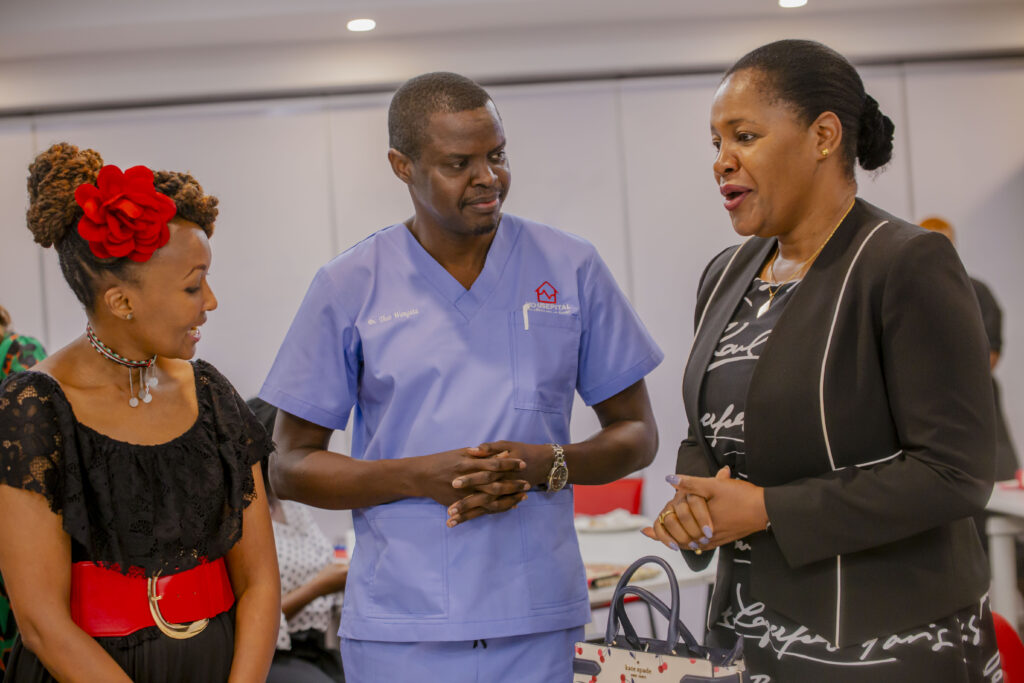
Photo from Left: Golden connections international Ceo Makena Mathiu (in the red flower), Housepital Ceo Dr. Theo Wangata and ABSA Bank Kenya Banking Director Elizabeth Wasuuna during the flagging off of ABSA business club SMEs to Estonia and Finland for a 10day Business exchange trip .
“I realized we needed a solution beyond the traditional hospital setup,” he says. “So, we arranged for oxygen to be delivered to the patient’s home and assigned a nurse to manage it. That moment sparked the idea of expanding healthcare services into people’s homes.”
As the pandemic progressed, the demand for home-based care grew. Families appreciated the convenience and safety of receiving medical attention without exposure to hospital environments. What started as a response to an emergency became a fully-fledged healthcare model.
The Technology Behind the Transformation
Housepital’s services are accessible through a user-friendly mobile application. Patients or their families can request services ranging from consultations to diagnostics with just a few taps. Additionally, an emergency helpline ensures immediate responses for urgent medical needs.
“Technology plays a crucial role in our operations,” says Dr. Wangata. “With portable diagnostic machines and telemedicine capabilities, we can handle many medical conditions remotely without compromising on quality.”
For instance, portable x-ray machines and ultrasound devices can produce high-quality images comparable to hospital-based equipment. The results are immediately available for doctors to analyze, ensuring swift diagnoses and treatment adjustments.
Overcoming Limitations and Challenges
While Housepital brings a wide array of services into homes, certain limitations persist. Major surgeries and complex imaging procedures, like MRI and CT scans, still require hospital visits due to equipment constraints. Additionally, the need for specialized theaters and sterilized environments makes certain treatments impractical for home settings.
“Surgery is one area where we draw the line,” admits Dr. Wangata. “We can handle minor procedures like wound dressing and circumcisions at home, but major surgeries must be performed in hospital theaters.”
Another challenge is the mental shift required for both medical professionals and patients. Hospitals traditionally symbolize safety and expertise, while home-based care is often associated with basic nursing. Housepital is working to redefine these perceptions through consistent, high-quality services and community engagement.
A Nationwide and Global Reach
Housepital’s operational model isn’t restricted to major urban centers. The company has developed networks of vetted healthcare professionals across various regions. For instance, a critically ill child in Webuye was successfully transferred to Nairobi with the help of an ICU-trained doctor and nurse, along with a specially equipped ambulance.
Even international patient transfers have become part of the service portfolio. Housepital has facilitated patient movements to countries like India, ensuring continuous medical supervision throughout the journey.
“Our network extends beyond borders,” Dr. Wangata notes. “We have collaborated with healthcare providers in multiple countries to support our patients’ medical journeys.”
The Future of Healthcare: Home as the New Hospital
As healthcare evolves, the Housepital model stands as a testament to the potential of patient-centric innovations. The convenience, cost-effectiveness, and personalized care offered by home-based services align with the growing preference for on-demand, accessible healthcare.
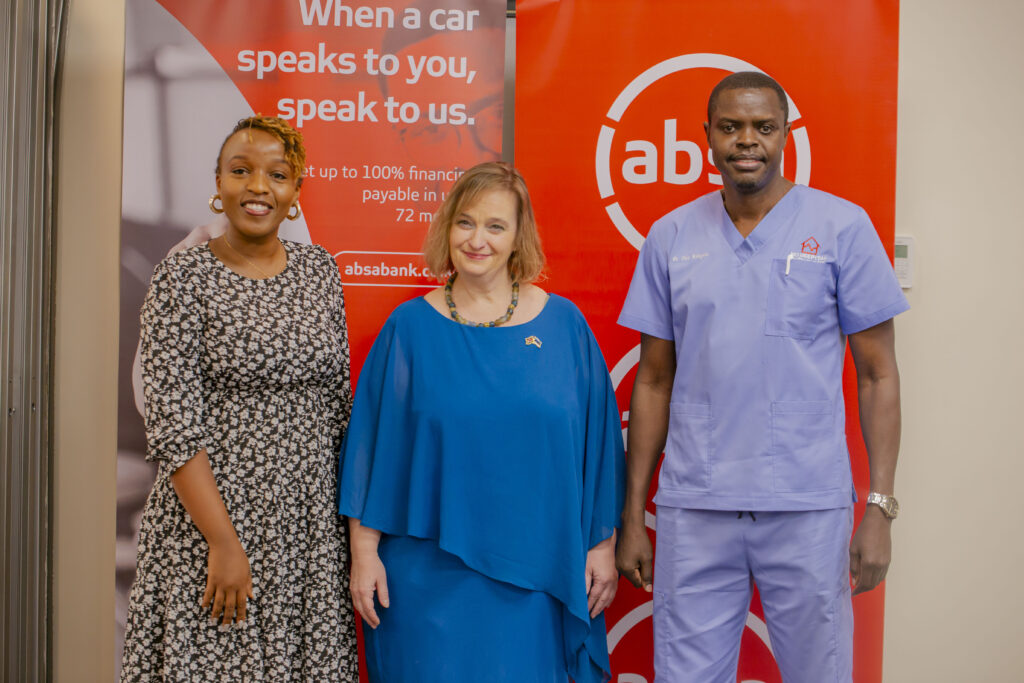
“Necessity is indeed the mother of invention,” reflects Dr. Wangata. “The pandemic taught us that healthcare delivery can be more flexible, responsive, and compassionate. Housepital is not just about convenience—it’s about transforming healthcare into a more human-centered experience.”
With its robust service offerings, technological integration, and passionate leadership, Housepital is poised to redefine healthcare, proving that sometimes, the best medicine really is staying at home.
